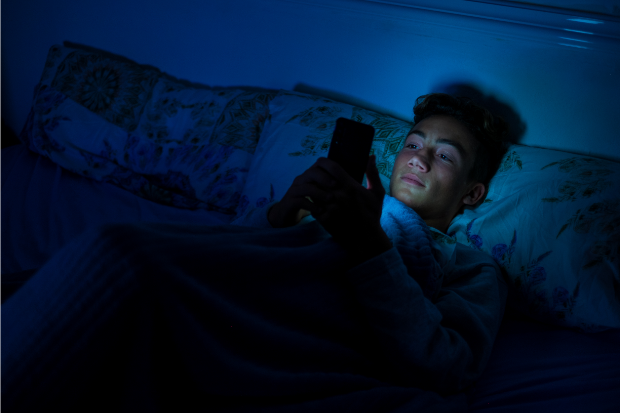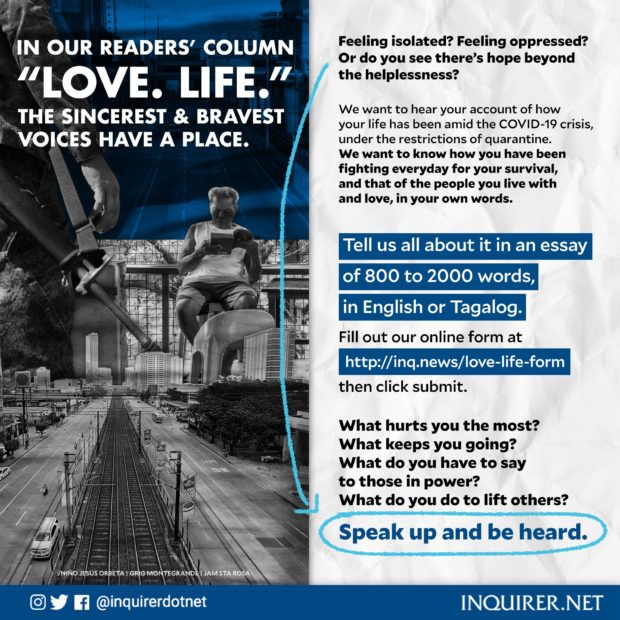A virtual self

INQUIRER.net stock photo
I cannot, for my life, define myself. Who am I? What am I? I think these questions are supposed to be difficult so we could spend an entire lifetime trying to come up with an answer. Although I realized, quite recently, that we are endowed with something to give us the illusion of this enigmatic thing called identity.
I’m talking about the web, of course. Where else could you find a person’s best attempt to shape the self into something? To mold themselves with words and images and clips so that the others would have an understanding of what and who they are?
The pandemic has further complicated a lot of already complicated things about life. Meeting friends was a challenge; meeting new people, an almost impossibility at least for myself. I resorted to apps to meet new people and was fortunate enough to meet this guy whose interests were the same as mine. We both love reading, and we somehow listen to the same songs. A few hours after our first conversation, we moved from one app to another – Facebook, which happened to be the only social media account that I consider worth keeping. My Instagram was mostly useless, while I’ve long deactivated my Twitter account.
Our subsequent exchange progressed. We’d voice call for hours almost every day. He worked day shift in a call center. I was on a night shift for a U.S.-based educational consulting firm. My job was the sort with a “fast-paced environment,” and talking to someone at the end of my shift was a reprieve of sorts. We exchanged grievances, Spotify playlists, highlights for the day, or even plain stinking jokes. These things comforted both of us, especially myself, whose divide between work and home had blurred.
One day, this friend of mine told me how he felt intimidated by me. When I asked him why, he said “Because you’re just 25, and it seems you have accomplished quite a few things already.” He said he feels quite hesitant to meet me because of this. He pointed out the book and articles I’ve written, and that I am “talented.” He was referring to things I’ve shared on FB. That’s when I realized the risk I had unknowingly taken by keeping a social media account.
His comment had made me pause and look at what I have on my wall. A video of myself playing a piece by Bach on the keyboard. Articles I’ve written that appeared online. Advertisements for this book I was lucky enough to get published. Pictures of me on a stage receiving an unexpected award, or with friends when we launched a zine, or with writing fellows on a tour in an old mansion.
The accumulation of these things on my Facebook wall had become a stranger’s introduction to my life. And I may have subconsciously curated all these to make me look like I am someone. But who is this someone? And is this image of myself the same image that a stranger I met online would form inside his head?
This is the risk: the potential to be valued according to what we share online. To some, a photo of your meal, a selfie, the type of news and memes and quotes you share, all these are hints to what sort of person you are. And your social media account, being a record of these, becomes an organic whole that could potentially define who you are to another.
I don’t want to be reduced to my virtual wall. I am yet to be sure how I could define myself to another. Am I a writer? A bad one, probably. Am I a musician? Absolutely not. Am I a good son or friend or citizen? I don’t know. Am I just a confused mess? Maybe.
The thing is I simply don’t know how to summarize the life I’ve lived so far and the self that emerged from my experiences. I may have a vague idea, but I cannot be confident about it, pretend that when I look someone in the eye, I would instantly know how am I being perceived as a person. And what really struck me with what my friend said is that he seemed to have this idea of what I am, by simply looking at the things I’ve posted.
There’s a certain pressure in it. I have really wanted to be close to this guy, but what if, when we finally meet, I did not fit the image that he has in his mind? What if I disappoint him because I had nothing else to offer besides my supposed “achievements”? Phone calls could only do so much.
Once things get better, my friend and I are going to finally meet in person. I wonder if I could be articulate in person as in our phone calls. I wonder whether he would frown or smile when we stand face to face. I wonder what I could offer to further the friendship we’ve had so far.
What I’m sure of though is most of us are working on a definition of ourselves, day by day, minute by minute. And the self, I believe, could only be further defined by its connection with others. Not just in the way the web allows us; we do not live in a pixelated vacuum. Inward reflections would only be possible with the concept of the “outward.” And thus, my supposed direction: to know myself better, I shall reach “out.” While I am my own person, I must acknowledge that “I” won’t be possible without having encountered all the people I have known in my life, and that “I” should be open to the possibility of being defined, or even changed, by my reaching out to others. Be it in the form of help to those in need, or meals with the family, or an unrequited love.
Or even a meetup, perhaps with someone whom I believe would be willing to be part of my journey to discover who I really am.
_
George Gonzaga Deoso, 25 years old, is the author of The Horseman’s Revolt and Other Horrors (UST Publishing House, 2020), a collection of dark short fiction. He was a graduate of AB Literature and currently lives in Quezon City with his family, along with two dogs named Kidlat and Hi-Ho.
RELATED STORIES:
To drag, thank you for making me love what I see in the mirror

Image: INQUIRER.net/Marie Faro



















